|
Spring 2018 Issue
NEWS FROM ACT EARLY NETWORK PARTNERS |
|
Largest Group of Act Early Ambassadors in History Complete Annual Training at NCBDDD/CDC 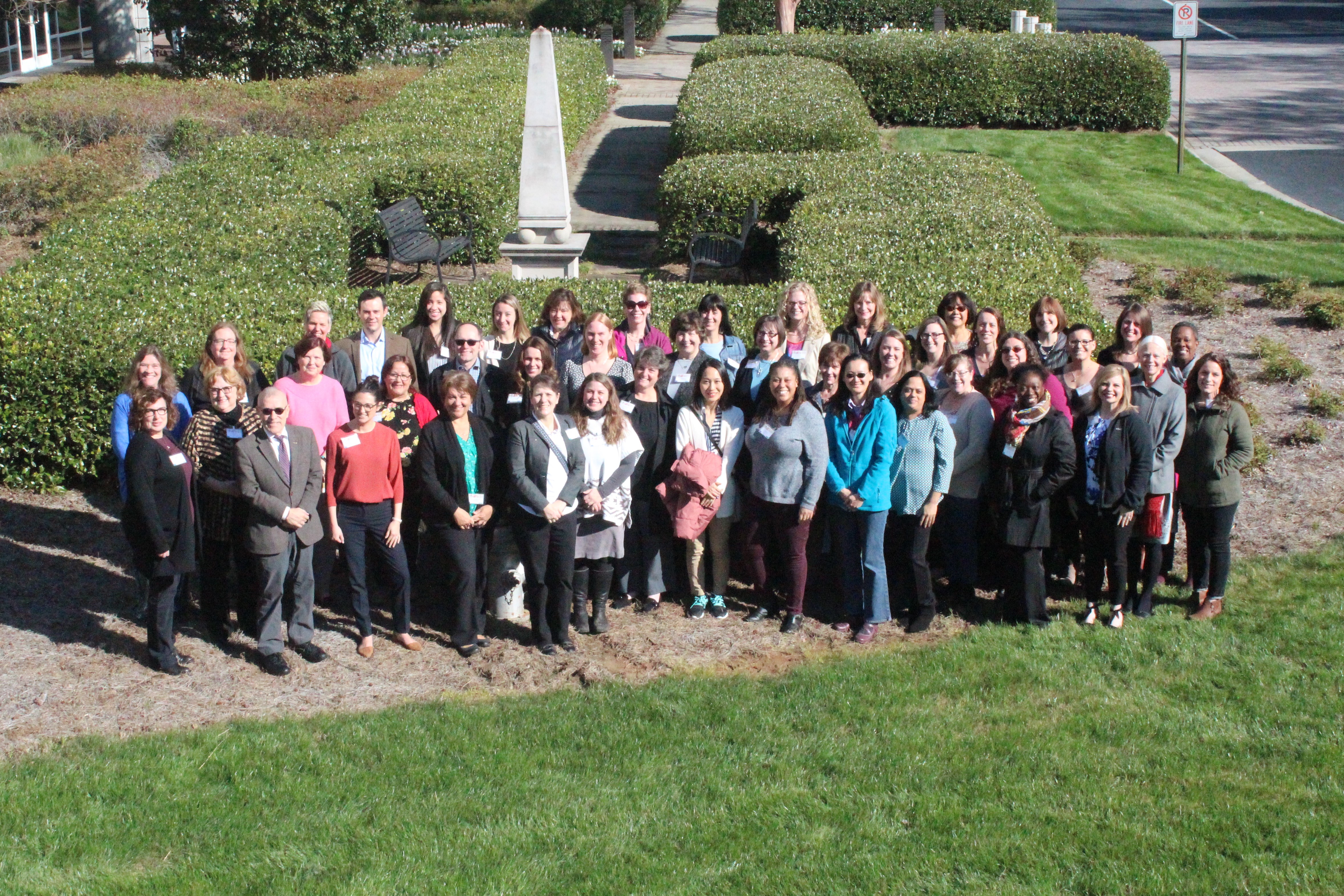 Twelve newly selected Act Early Ambassadors joined forces with a veteran cohort of forty-three Act Early Ambassadors representing 50 states and 4 territories on the campus of the Centers for Disease Control and Prevention (CDC) for the Annual Act Early Ambassador Training on March 14 & 15, 2018 hosted by the Learn the Signs. Act Early. Team at the National Center on Birth Defects and Developmental Disabilities (NCBDDD)/CDC along with project partners from the Association of University Centers on Disabilities (AUCD) and the Association of Maternal and Child Health Programs (AMCHP). Twelve newly selected Act Early Ambassadors joined forces with a veteran cohort of forty-three Act Early Ambassadors representing 50 states and 4 territories on the campus of the Centers for Disease Control and Prevention (CDC) for the Annual Act Early Ambassador Training on March 14 & 15, 2018 hosted by the Learn the Signs. Act Early. Team at the National Center on Birth Defects and Developmental Disabilities (NCBDDD)/CDC along with project partners from the Association of University Centers on Disabilities (AUCD) and the Association of Maternal and Child Health Programs (AMCHP).
Over the course of two days, Ambassadors heard from several of their colleagues and national partners on best practices and innovative activities and products to increase developmental monitoring and screening in the field.
Act Early Ambassadors serve as liaisons to the "Learn the Signs. Act Early." Program and work as community champions with programs that serve young children and their parents, such as Head Start, Early Head Start, WIC, home visiting, and others. They also work with health care, early education, and child care professionals to improve early identification of developmental delay and collaborate with state agencies and campaign partners to improve policy and programs for early identification.
The Act Early Ambassador project is designed to develop a network of state-level experts to improve early identification practices. It is a collaborative effort on behalf of the CDC's NCBDDD, the Health Resources and Services Administration's (HRSA) Maternal and Child Health Bureau (MCHB), AUCD, and AMCHP. For more information on the Act Early Ambassadors, please click here.
. . . . . . . . . . . . . . . .
|
|
Better Together: Developmental Screening and Monitoring Best Identify Children who Need Early Intervention 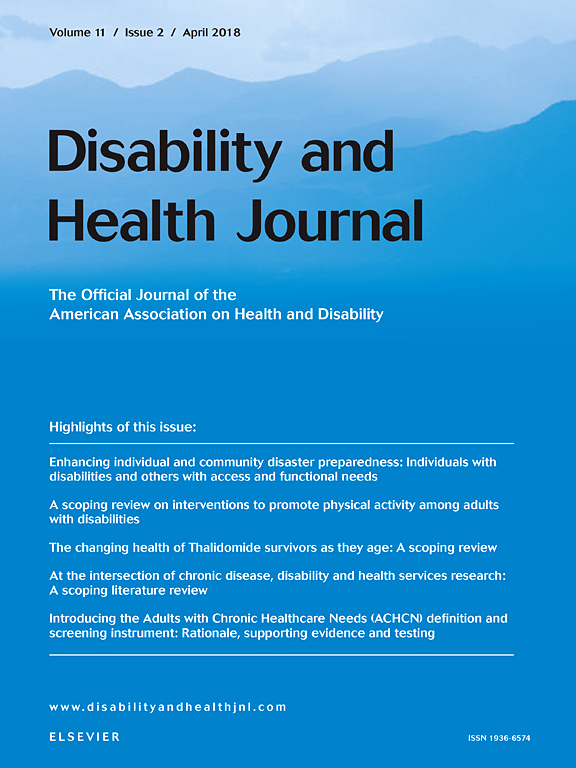
Children at risk of developmental disabilities or delays who receive both monitoring and screening are more likely to receive the early interventions they need than their peers who receive either monitoring or screeining, according to a study led by Dr. Brian Barger-a researcher at the Georgia State University UCEDD and Policy Fellow with the "Learn the Signs. Act Early." team at NCBDD.
The study's findings support the American Academy of Pediatrics' recommendations that developmental monitoring and screening are "complementary strategies for improving early identification and linkage to early intervention for young children," the researchers said. "Ideally, developmental monitoring and developmental screening should be used in tandem to maximize sensitivity to potential developmental delays."
Researchers used data from the 2007/2008 and 2011/2012 National Survey of Children's Health, which report the prevalence of children age 10 months to 3 years who received both developmental monitoring and screening, either monitoring or screening by itself, or neither. The researchers then compared the odds of receiving early interventions across those groups.
The results are published in the Disability and Health Journal in the article "Better Together: Developmental Screening and Monitoring Best Identify Children who Need Early Intervention."
. . . . . . . . . . . . . . . .
|
|
NEWS FROM THE ACT EARLY NETWORK |
|
Improving Early Identification in Worcester, MA, An Underserved and Culturally Diverse Community 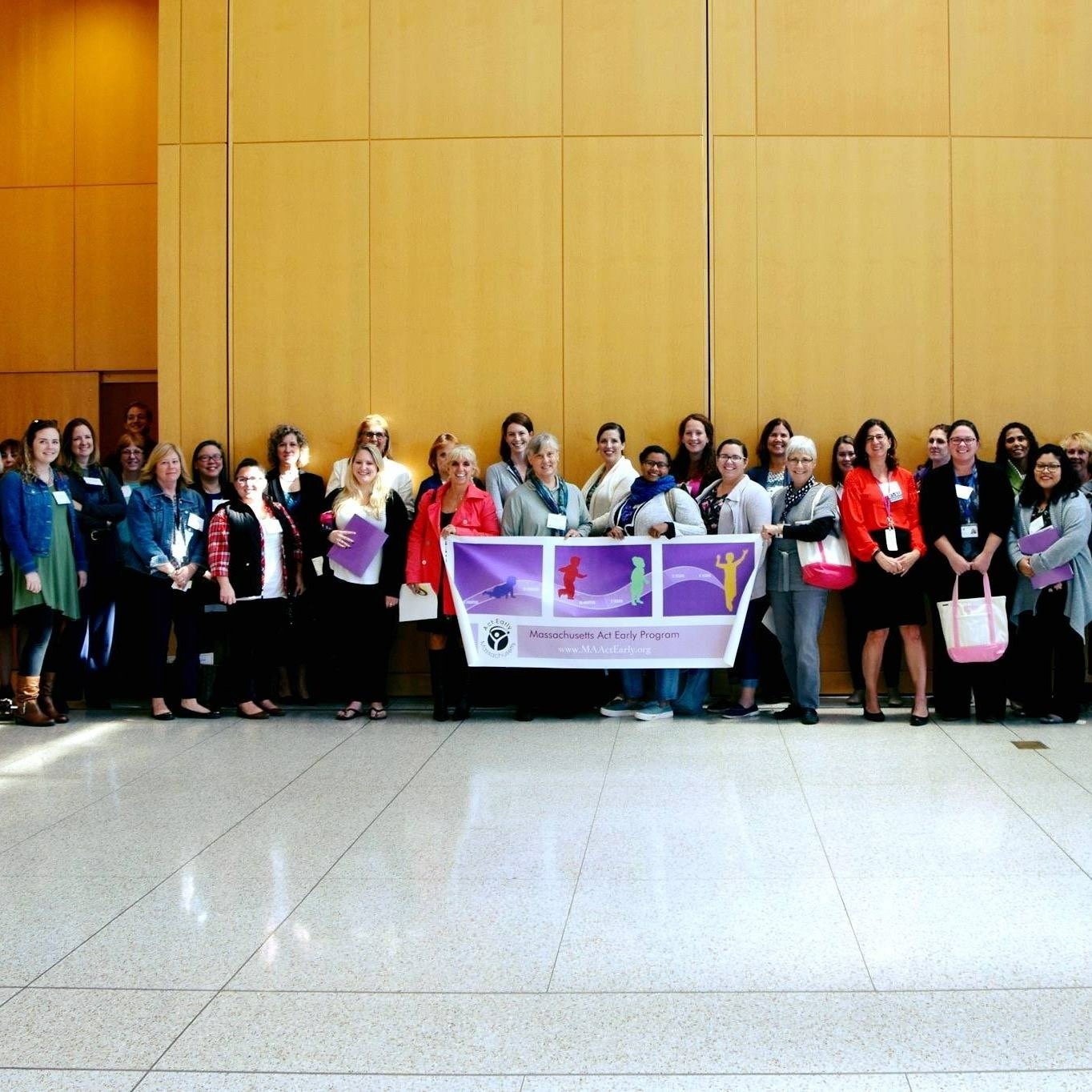 Over the last two years, Massachusetts Act Early Ambassador, Dr. Roula Choueiri, has used her role as a Neurodevelopmental Disabilities Pediatrician and Chief of the Division of Developmental and Behavioral Pediatrics at the University of Massachsetts Medical School to set up training on a new level-2 autism screening test, the Rapid Interactive screening Test for Autism in Toddlers (RITA-T) as well as training on the LTSAE material. Over the last two years, Massachusetts Act Early Ambassador, Dr. Roula Choueiri, has used her role as a Neurodevelopmental Disabilities Pediatrician and Chief of the Division of Developmental and Behavioral Pediatrics at the University of Massachsetts Medical School to set up training on a new level-2 autism screening test, the Rapid Interactive screening Test for Autism in Toddlers (RITA-T) as well as training on the LTSAE material.
Dr. Choueiri and her team partnered with the THOM Early Intervention program in Worcester, the largest program in Worcester that is a heavily culturally diverse and underserved area. Their efforts coincided with the institution of universal screening in their program led by Chantal Roger-Haig, LMHC and Jeanine Mindrum, SLP. They created a two level screening system for ASD integrating the MCHAT-R, the RITA-T and the LTSAE. Over two years they have identified and evaluated 160 toddlers within a wait time of 4 weeks in average. Referrals to one ABA provider in the area doubled and the age at referral for ABA is starting to show a decrease from 30 months at referral in 2015 to 28 months at referral in 2017. They continue this project and are starting to generalize it to other programs, clinics and early childhood providers.
Please visit the Massachusetts Act Early Website or Facebook page to stay up to date on this work as more trainings are developed to serve underserved geographical areas in MA, reach additional providers, and improve early recognition of developmental delays.
. . . . . . . . . . . . . . . .
|
|
Minnesota LTSAE, MNLEND & MN Latino Childcare Providers Collaboration 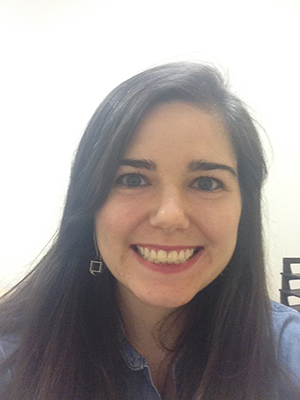 MNLEND Fellow, Alice Kraiza, housed in the ICI at the University of Minnesota, is collaborating with leaders of the Latino Childcare Providers Network (La Red), a Family, Friend, and Neighbor (FFN) provider group based out of Richfield and Bloomington, Minnesota. La Red/The Network's Director, Ruth Evangelista, and Alice are developing a new training program on early developmental milestones and signs of Autism using "Learn the signs. Act Early." materials and resources for the wider Latinx FFN network. Per Evangelista, "I believe this training is a good for la Red. MNLEND Fellow, Alice Kraiza, housed in the ICI at the University of Minnesota, is collaborating with leaders of the Latino Childcare Providers Network (La Red), a Family, Friend, and Neighbor (FFN) provider group based out of Richfield and Bloomington, Minnesota. La Red/The Network's Director, Ruth Evangelista, and Alice are developing a new training program on early developmental milestones and signs of Autism using "Learn the signs. Act Early." materials and resources for the wider Latinx FFN network. Per Evangelista, "I believe this training is a good for la Red.
The greatest contributions are to break the language barriers, understand what autism is in the Friend, Family and Neighbor community and how to go hand in hand with FFN providers." "Creo que este entrenamiento esta bien para la Red y la gran aportación es romper las barreras de lenguaje y entender que es el AUTISMO en la comunidad FFN y como ir de la mano con las familias amigos y vecinos." Alice is working closely on this project with guidance from both her MNLEND mentor, Dr. Robin Rumsey, and Dr. Jennifer Hall-Lande, MNLEND Faculty and Act Early Ambassador to Minnesota.
Since fall 2017, Alice has contributed Minnesota LTSAE materials, as well as assisted in designing a business plan for the organizational outreach efforts of La Red. The team is ensuring the training and outreach will be relevant, appropriate, and informative. The community training will be delivered in Spanish, and they anticipate about 45 childcare providers from across the Twin Cities metro area will attend the first April 2018 training.
. . . . . . . . . . . . . . . .
|
|
Statewide Webinar for Early Intervention Providers in Virginia 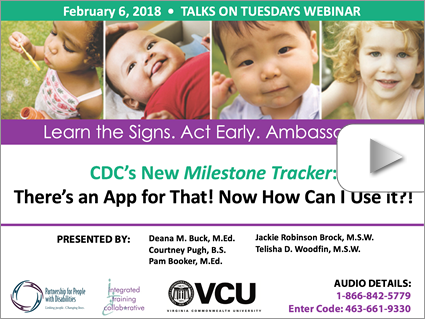
Deana Buck, Act Early Ambassador for Virginia and Project Director/Early Childhood Content Lead at the Virginia UCEDD conducted a statewide webinar for early intervention providers in February through Virginia's Early Intervention Professional Development Center to spread awareness about CDC's new Milestone Tracker App, and plans to offer a similar webinar for infant & toddler child care providers, in partnership with the Virginia Infant & Toddler Specialist Network, in June 2018-a network of over 9,000 providers statewide. A recording of this webinar is freely available and can be accessed through this site.
. . . . . . . . . . . . . . . .
|
|
New Jersey Early Childhood Comprehensive Systems Collaborative Improvement and Innovation Network Ages and Stages Playdate 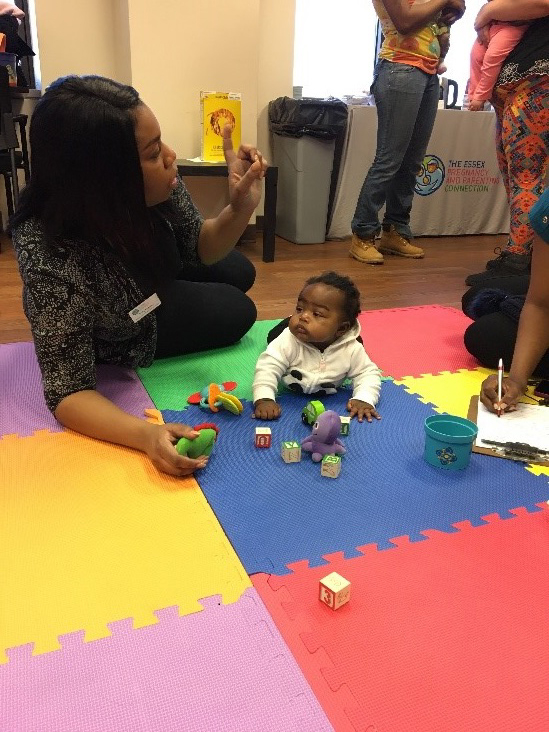 As part of New Jersey's Early Childhood Comprehensive Systems Collaborative Improvement and Innovation Network (ECCS CoIIN initiative), Essex Pregnancy and Parenting Connection recently hosted 7 moms and their infants for an event in Newark, NJ to help them learn more about their children's development while also completing an Ages and Stages Questionnaires (ASQ) screening to track their baby's developmental milestones. Our staff explained the ASQ tool, gave an overview about developmental domains, and informally guided and encouraged parents as they tried some of the activities and completed the questionnaire. All participants reported learning new activities to do with their child. Parent comments included "I liked that everyone was very hands on" and "It was informative and fun. It was nice to meet other moms". Along with a copy of and discussion about their child's screening results, parents each received CDC's Learn the Signs, Act Early materials (developmental passport, milestones brochure and growth chart), ASQ learning activity ideas based on age/domain, community resource info, baby books and more. Our full Essex ECCS CoIIN team will consider how we can replicate this activity through others and on a somewhat bigger scale to reach more families whose children are not already being screened. As part of New Jersey's Early Childhood Comprehensive Systems Collaborative Improvement and Innovation Network (ECCS CoIIN initiative), Essex Pregnancy and Parenting Connection recently hosted 7 moms and their infants for an event in Newark, NJ to help them learn more about their children's development while also completing an Ages and Stages Questionnaires (ASQ) screening to track their baby's developmental milestones. Our staff explained the ASQ tool, gave an overview about developmental domains, and informally guided and encouraged parents as they tried some of the activities and completed the questionnaire. All participants reported learning new activities to do with their child. Parent comments included "I liked that everyone was very hands on" and "It was informative and fun. It was nice to meet other moms". Along with a copy of and discussion about their child's screening results, parents each received CDC's Learn the Signs, Act Early materials (developmental passport, milestones brochure and growth chart), ASQ learning activity ideas based on age/domain, community resource info, baby books and more. Our full Essex ECCS CoIIN team will consider how we can replicate this activity through others and on a somewhat bigger scale to reach more families whose children are not already being screened.
|
|
Montana's LTSAE Facebook Campaign 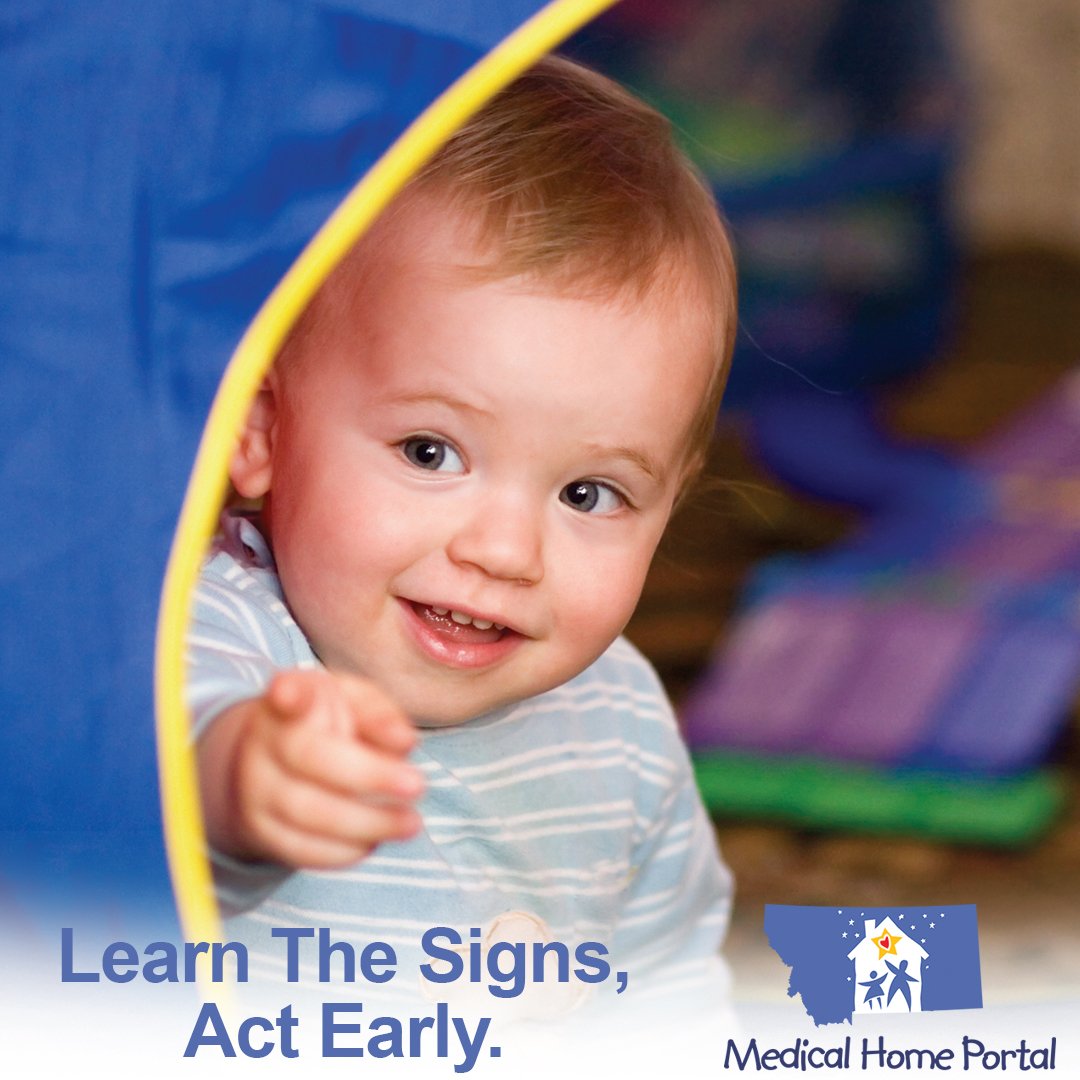
In addition to sharing LTSAE materials across Montana through mailings, trainings, and community events, the Montana Autism Center (MAC) has developed new partnerships and tapped into a new medium to expand its reach. Partnering with the online Montana Medical Home Portal, a source of reliable information about children and youth with special health care needs, the MAC used social media to connect with families. Specifically, the MAC launched targeted Facebook ads to reach families with newborn or young children in Montana. The most recent ad directed Facebook users to a Medical Home Portal page with Early Intervention information, including details about services, eligibility, and the referral/evaluation process. It also included Montana-specific resources related to early intervention. In a two-week span, the campaign reached over 3,000 Montanans and led to 250 "link clicks." Given the difficulties in reaching families in a large, rural state, we are excited by the possibilities of using social media to connect with families who otherwise might not be able to access information about developmental milestones and resources. We will continue to use social media to spread LTSAE materials (e.g., Milestone Tracker App, Watch Me trainings) to families and health care providers.
.. . . . . . . . . . . . . . .
|
|
|
|
|
Children's Bureau Express Spotlight on Early Childhood Collaboration & Early Intervention 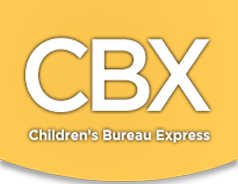 The Children's Bureau Express (CBX) covers news, issues, and trends related to child maltreatment, child welfare, and adoption for interested professionals and policymakers. The February 2018 issue of CBX provides a series of articles that focus on early childhood collaboration and early intervention. The Children's Bureau Express (CBX) covers news, issues, and trends related to child maltreatment, child welfare, and adoption for interested professionals and policymakers. The February 2018 issue of CBX provides a series of articles that focus on early childhood collaboration and early intervention.
. . . . . . . . . . . . . . . .
|
|
Vaccination Patterns in Children After Autism Spectrum Disorder Diagnosis and in Their Younger Siblings
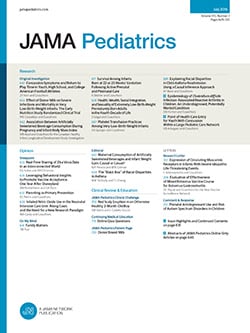 Children who are diagnosed with autism spectrum disorder and their younger siblings are less likely to get the full complement of recommended vaccines, according to a study in JAMA Pediatrics. Children who are diagnosed with autism spectrum disorder and their younger siblings are less likely to get the full complement of recommended vaccines, according to a study in JAMA Pediatrics.
In a matched cohort study of 3729 children with autism spectrum disorder and 592,907 children without autism spectrum disorder, the authors found that children with autism spectrum disorder were less likely to be fully vaccinated for vaccines recommended between ages 4 and 6 years. The younger siblings were also less likely to be fully vaccinated for vaccines recommended at any age.
|
|
Preliminary Evaluation of a Brief Autism Screening in Young Children
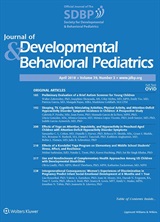 A new study published in the Journal of Developmental and Behavioral Pediatrics indicates a two-minute questionnaire for parents to help enhance the detection of autism among toddlers, enabling early intervention at a crucial stage of development. A new study published in the Journal of Developmental and Behavioral Pediatrics indicates a two-minute questionnaire for parents to help enhance the detection of autism among toddlers, enabling early intervention at a crucial stage of development.
Researchers at Rutgers New Jersey Medical School developed the Psychological Development Questionnaire (PDQ-1), which demonstrated an 88 percent likelihood of correctly identifying which of the youngsters who screened positive per the questionnaire had autism spectrum disorder (ASD).
Researchers screened a diverse population of nearly 2,000 low-risk children, age 18 to 36 months through a network of cooperating pediatric practices in New Jersey. The PDQ-1 questionnaire asks parents about behaviors such as whether the child points or gestures to show interest or get attention, responds to their name, enjoys playing peek-a-boo, speaks in phrases and relates to others. Children with low PDQ-1 scores received comprehensive developmental evaluations to determine whether they were on the autism spectrum. Results detected individuals with autism from all socioeconomic communities who had not come to professional attention.
The American Academy of Pediatrics has urged pediatricians to screen all children for ASD at 18 and 24 months, yet only half of all children are screened at that age. "Diagnosis of autism can only be accomplished through comprehensive evaluation by a professional," researchers noted. "Effective screening is but the first step toward diagnosis. If we want to improve early detection, easy-to-use and reliable autism screeners need to be widely used."
|
|
|
|


